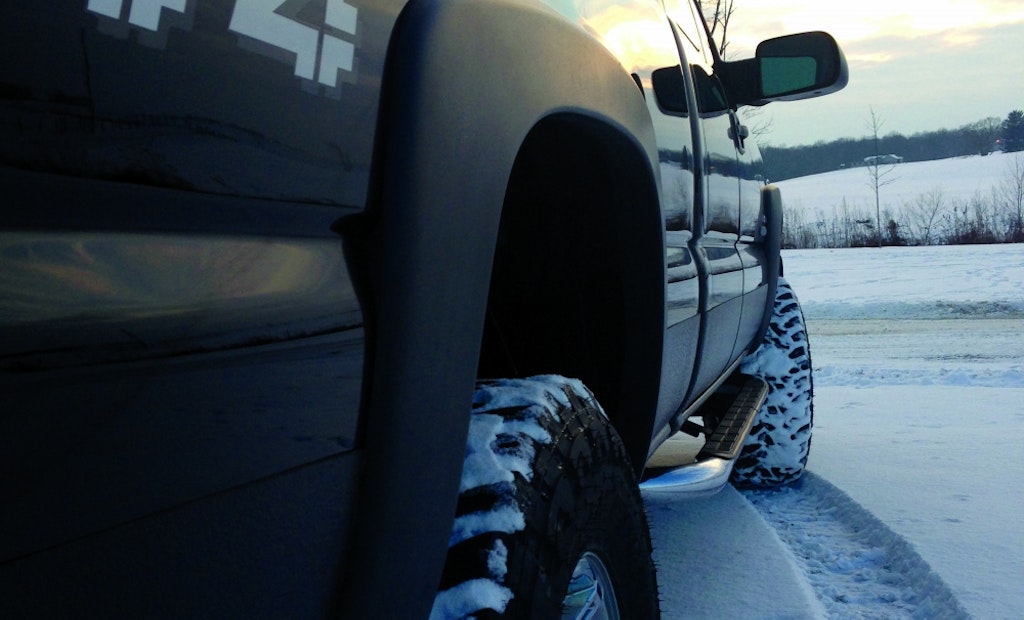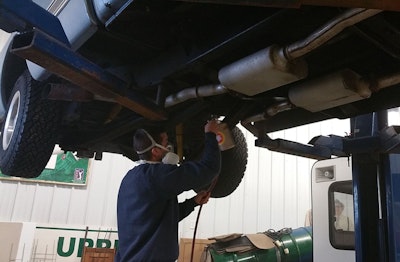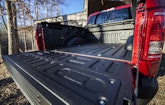
Interested in Trucks?
Get Trucks articles, news and videos right in your inbox! Sign up now.
Trucks + Get AlertsGiven enough time, any object made of iron or steel exposed to oxygen or moisture will oxidize, or rust. Exposure to chemicals such as road salts or acids only accelerate the process. The good news is that there’s a host of strategies — from chemical treatments to barriers — that can be used to beat rust at its own game.
The first question any work vehicle owner should ask is whether a corrosion treatment makes financial sense, says Leslie Wong, vice president of customer and dealer service at Unhaggle.com, a service designed to help buyers negotiate the best price for a vehicle.
He notes that new pickup trucks, for example, offer warranties against rust perforation or surface corrosion. “If you don’t intend to keep the vehicle beyond the point where the vehicle’s manufacturer rust warranty runs out, then there is absolutely no point in paying for rustproofing,” he says.
Even GMC’s own website notes: “Application of additional rust-inhibiting materials is not required under the corrosion coverage and none is recommended.”
Many choices
The home turf of the vehicle also plays a part. Locations experiencing heavy winters and lots of road salt offer more corrosion risk. So do coastal areas where salty sea spray eats metal. While rustproofing can make a big difference to vehicle longevity in salt-prone locations, simply washing the vehicle regularly is the best way to remove the salt that causes rust.
Most rustproofing treatments fall into several categories: undercoating with tar-based sprays, dripless oil sprays, drip oil sprays, rust conversion sprays and bed liners. Some of these treatments are available as do-it-yourself products, while others are proprietary products that can only be applied professionally.
Undercoating with tar-based sprays
Using this method, tar-based sprays are applied underneath the vehicle and into wheelwells, and harden into a solid barrier. While the barrier remains intact, the protected surface won’t rust. However, undercoating should be inspected annually to ensure it remains intact. If the surface cracks or peels, moisture can penetrate the coating and migrate behind the barrier, forming unseen rust.
Dripless oil spray
Dripless oil sprays form a waxy barrier and generally cover more area than undercoating. It can be applied to wheelwells, hoods and rocker panels. To fully apply the product, holes must be drilled into door panels and other areas of the vehicle.
Drip oil sprays
Drip oil sprays are thinner than dripless sprays, and are similarly applied through holes drilled into door panels and other sections of the vehicle. The upside: The thinner spray tends to reach the inner crevices of the truck a little better then dripless sprays. The downside: The truck will drip a little oil for a few days after application.
Rust converters
These chemicals can transform red iron oxide into a more stable form, ferric tannate, which can be painted.
DIY approach
Theoretically, truck owners can buy products in each category and perform rustproofing themselves.
Pro Form Products Ltd., for example, sells a range of dripless oil products, wax-oil blends, rubber plugs to seal drill holes and anything else a truck owner might need for rustproofing.
However, Pro Form tech expert Robin Wason points out that many of the company’s customers use the products for loving restoration and maintenance of cherished vehicles — not a quick rustproofing job for a company pickup.
“The largest part of our market is people who spend an inordinate amount of time taking their vehicles apart and putting them back together again,” he says. “We sell these products with a complete kit, with wands and applicators. The buyer would need to supply a wire brush and sandpaper to loosen any rust and typical protective gear for automotive work — nothing exotic.”
On the other hand, Mike Stansbery, owner of Wyandot RustProofing LLC in Upper Sandusky, Ohio, believes that truck owners can benefit from the thorough work of a professional. He exclusively applies Fluid Film, a lanolin-based formulation applied under nonaerosol pressure and acting most like a dripless oil spray.
“I’ve rustproofed everything from farm machinery to pickups, dump trucks and semis,” he says. “If it can rust, we’ll do it.”
Having a full range of equipment and rustproofing experience makes all the difference, he says.
“I have a gun specially optimized for spraying the product,” he says. “I also have a series of wands that you won’t likely find in the average garage. One of them is a 3-foot flexible wand with 360-degree spray head. With that equipment, I can be more thorough and much quicker. I had a customer in here with a pickup truck who rustproofed it himself last year. It took him more than eight hours and it took me 90 minutes.”
Bed liners
Some truck owners choose bed liners to rustproof their trucks using either do-it-yourself or professionally applied products.
Paul DeSmet, executive vice president at LINE-X, notes that his company’s bed liner is applied using advanced equipment at high temperature by trained professionals to ensure a durable bond to the metal beneath, while do-it-yourself products are often rolled on.
“LINE-X could be considered a rustproofing treatment,” he says. “Any existing rust would need to be removed and treated prior to the LINE-X application, but once LINE-X is applied, it will resist future corrosion.”
The product is available in several formulations and is now often used beyond bed liners. In a formulation stable under ultraviolet light, it’s used to coat exterior panels, floors or any part of the truck that requires corrosion and abrasion resistance.
“LINE-X has been applied to Bobcats, UTVs, forklifts, tractors, haulers, trailers and more,” says DeSmet.
He notes that company techs have seen LINE-X coatings that have lasted as long as 15 years in the field. The one common factor that predicts longevity is the condition of the metal substrate.
As with most rust protection products, the best time to apply is before you see any rust at all.







